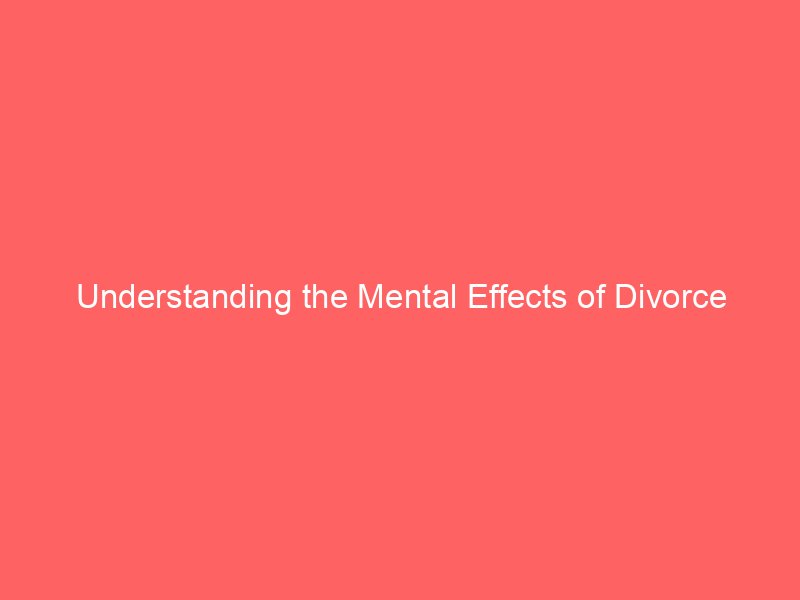
Divorce is a significant life event that can have profound effects on one’s mental well-being. It is important to recognize and understand these effects in order to navigate the emotional challenges that arise during and after the process.
- Emotional Rollercoaster: Divorce often triggers a range of intense emotions, such as sadness, anger, fear, and confusion. These emotions can come and go like waves, creating a rollercoaster-like experience. It’s crucial to remember that these feelings are a natural response to the end of a significant relationship. The emotional rollercoaster experienced during divorce can bring forth intense feelings of sadness, anger, fear, and confusion, which are normal reactions to the dissolution of a significant relationship.”
- Anxiety and Stress: Divorce can be an incredibly stressful experience, leading to heightened anxiety levels. The uncertainty of the future, financial concerns, and changes in living arrangements can contribute to overwhelming stress. It is important to seek support and develop coping mechanisms to manage these challenges effectively. Divorce often brings about heightened anxiety and stress, stemming from uncertainties about the future, financial worries, and changes in living arrangements. Developing effective coping mechanisms and seeking support are vital in managing these challenges.”
- Loss and Grief: Divorce involves the loss of shared life and the dreams that were once cherished. It can result in a grieving process similar to that experienced after the death of a loved one. Recognizing and allowing oneself to mourn this loss is an important step toward healing and moving forward. Divorce entails the loss of shared life and dreams, leading to a grieving process akin to mourning the death of a loved one. Acknowledging and allowing oneself to grieve is a crucial aspect of healing and progressing.”
- Self-Esteem and Confidence: The end of a marriage can significantly impact one’s self-esteem and confidence. Feelings of rejection, failure, and self-doubt may arise, making it challenging to rebuild a positive self-image. Engaging in self-care, seeking therapy, and surrounding yourself with supportive individuals can help boost self-esteem during this period. Divorce can greatly affect self-esteem and confidence, giving rise to feelings of rejection, failure, and self-doubt. Engaging in self-care, therapy, and building a supportive network can assist in rebuilding a positive self-image.”
- Loneliness and Isolation: Divorce often disrupts social connections, leading to feelings of loneliness and isolation. Changes in living arrangements, reduced contact with mutual friends, and the need to establish new routines can contribute to this sense of isolation. It is important to reach out to friends, family, or support groups to combat loneliness and build a new social network. Divorce can disrupt social connections, resulting in loneliness and isolation due to changes in living arrangements and reduced contact with mutual friends. Building a new social network and seeking support from friends, family, or support groups is vital in combating this sense of isolation.”
- Parental Challenges: For parents, divorce introduces a unique set of mental challenges. Co-parenting responsibilities, adjusting to single parenthood, and managing potential conflicts with the ex-spouse can be emotionally taxing. Seeking professional guidance, maintaining open communication, and prioritizing the well-being of the children can help them navigate these challenges effectively. Divorce brings about specific mental challenges for parents, such as adjusting to single parenthood, co-parenting responsibilities, and managing conflicts with the ex-spouse. Seeking professional guidance, maintaining open communication, and prioritizing children’s well-being are essential in successfully navigating these challenges.”
Conclusion:
Divorce can have a significant impact on one’s mental well-being, triggering a range of emotions and challenges. Understanding these effects and seeking appropriate support are crucial steps in managing the emotional rollercoaster that accompanies divorce. By prioritizing self-care, seeking therapy, and building a support network, individuals can foster resilience and move towards healing and personal growth. By prioritizing self-care, seeking therapy, and building a support network, individuals can foster resilience, manage the emotional challenges of divorce, and embark on a path of healing and personal growth.”